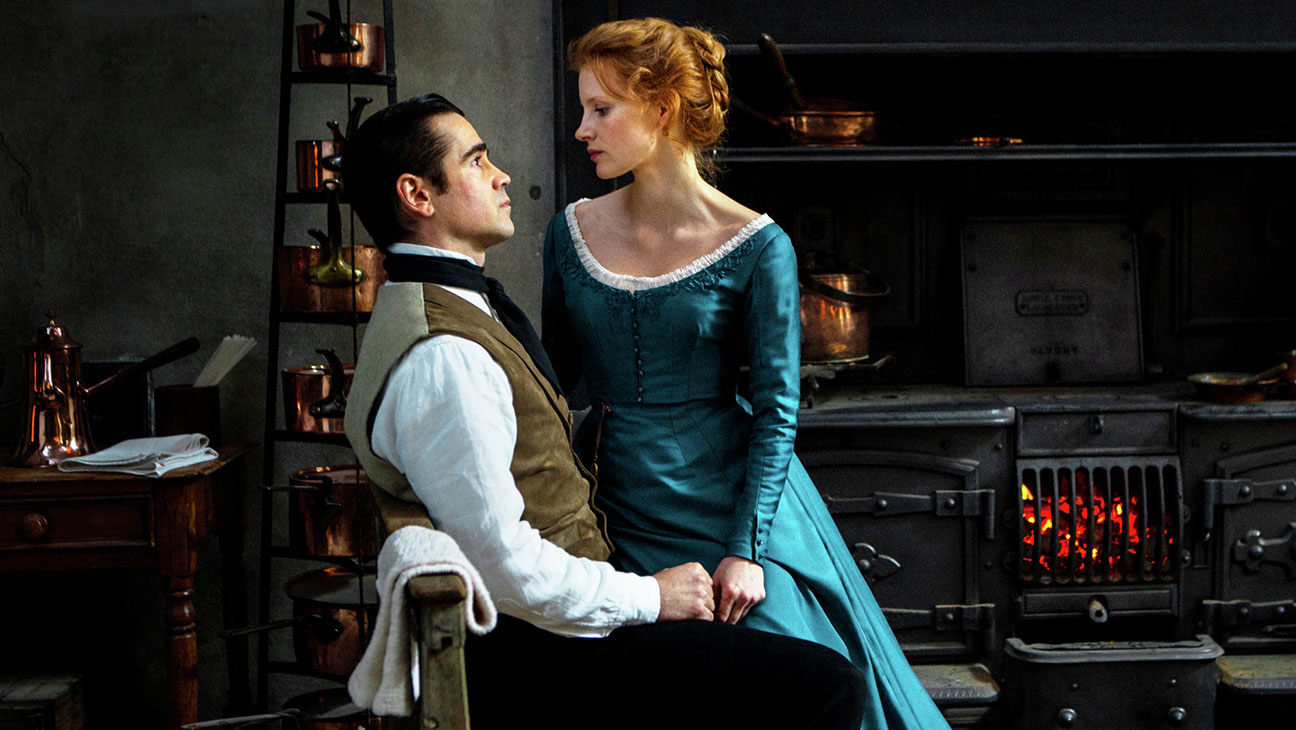By Chlotrudis Independent Film Society
Rating: 4 cats
Director: Liv Ullman
Starring: Colin Farrell | Jessica Chastain | Nora McMenamy | Samantha Morton

Original language title: Froken Julie
Country: canada, france, ireland, norway, united_kingdom, united_states
Year: 2014
Running time: 129
IMDB: http://www.imdb.com/title/tt2667960/combined
Jason says: “One often talks of ‘opening up’ plays when adapting them to film, doing things to obscure the fact that they were originally created to take place in a limited number of limited spaces, all viewed from a single vantage point. For her new English-language version of August Strindberg’s MISS JULIE, filmmaker Liv Ullmann does something unusual: She pushes the walls as far back as she can, but opts not to fill the space, resulting in a production that is cinematic while still emphasizing its theatrical origins.
“Only three characters show up on screen: John (Colin Farrell), a valet on a large Irish estate; Kathleen (Samantha Morton), the cook to whom he is more-or-less engaged; and Miss Julie (Jessica Chastain), the daughter of the Baron. It is Midsummer Night, and there are no others around, with the gentry off elsewhere and the rest of the servants having a revel of their own in the barn. Julie opts to stick around the castle and attempt to seduce the handsome valet, right in front of the man’s fiancée if she chooses, for she is the lady of the house and the lines one does not cross are very clear in 1890.
“”Strindberg’s FROKEN JULIE is (at least as presented here) a play so obsessed with class, propriety, and a woman’s virtue that it threatens to become obsolete to a modern audience, coming off as less an earnest and insightful drama of manners than a sort of satire. Western society is not yet classless or above judging people for what they do in private, but the rigidity on display here often seems oddly anti-dramatic, with the lack of choices not as interesting as a number that would require different sorts of sacrifices. There is also a strange tendency for attitudes to undergo very large shifts between acts, which can seem a bit jarring on-screen, as the fade to black in cinema is not quite the strong punctuation that lights going down is on the stage.
“Still, during the parts where Strindberg and Ullman have the knives out, the observations on the toxicity of the class divide are
tremendously sharp, from the obvious metaphor about potentially poisoning a pregnant dog rather than have her give birth to a
half-breed to discussions of how John has very concrete dreams of climbing a tree but the lowest branch being out of reach. It is
somewhat fascinating to see how entrenched the idea of the aristocracy is by how the people in the system tend to justify their own enslavement, especially toward the end when Kathleen seems to offer completely contradictory rationales for the status quo.
“That’s only the attitude some of the time, though, but it’s worth mentioning that whatever Ullmann wants from her cast, they give in spades. Jessica Chastain, for instance, is fantastic, whether in her almost-predatory scenes toward the beginning or later softening or desperation. There is a sense of instability to her at all times, and of all the cast, she is the one who does the best at making sure that the various ways she reacts in any given moment seems consist with what we’ve seen throughout the movie. Colin Farrell is no slouch either, though, doing a fine job of creating that guy who can’t climb to the lowest branch: There’s a keen intelligence to his John, even if he is also a man who finds himself fighting his own hardwiring, whether as a man or servant. There are large portions of the movie when one might wonder why Samantha Morton has been cast in such a small, thankless role, even if she is making every scene she’s in a little better, but rest assured, she gets both an explosion and a bit of ice toward the end that make her invaluable.
“Aside from an opening scene with young actress Nora McMenamy wandering the empty house and grounds as a young Miss Julie, those three are it, and Ullmann plays into that a bit – the kitchen where much of the action takes place is a large space and feels connected to the rest of the manor and grounds, giving Ullmann and cinematographer Mikhail Krichman room to move around and put space in between the three characters as well as comment on the arguably grotesque size of what is seen as a home to the Baron and his daughter, even if a fair-sized support staff is also there. They occasionally position the camera to exaggerate things a bit, putting people at the far end of a table and resting the camera on its surface rather than keeping it at eye level, or sometimes looking almost straight up. It’s a bit heavy-handed at times, like the flowers in the last scene, and there is a shot or two where I wondered if I wasn’t reading too much into something (I initially thought McMenamy substituted for Chastain in one charged scene, and that was a heck of a jolt if that’s what Ullmann was going for).
“It’s a bit ironic that Strindberg initially positioned FROKEN JULIE as a highly naturalistic play when he wrote it; a century-plus later in a more naturalistic medium, Ullmann has to emphasize the theatricality to make its best parts work. It’s a tough enough job to make the film rather uneven, although its periods of excellence more than make up for that parts where it seems to be going off-track. 4 cats
“Seen 6 December 2014 at Landmark Kendall Square #4 (first-run, DCP)”
